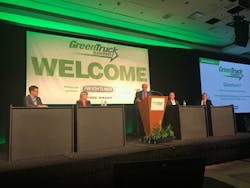Industry leaders share how new vehicle technologies will impact industry practices
The Green Truck Summit, held in conjunction with the Work Truck Show 2020 in Indianapolis, Ind. this week, featured panelist discussions focused on clean energy trends and initiatives for commercial vehicles. One of the sessions was titled, “How truck technology advances will impact industry practices,” and highlighted technologies currently in development, as well as future possibilities.
The session was presented by Bill Combs, vice president, Connected Vehicle Strategy and Experimentation, Penske Transportation Solutions; Michelle Moody, marketing director, Ford Commercial Solutions; Nick Rini, director of engineering, FCCC; and Rick Sapienza, director, Clean Transportation Program, NC Clean Energy Technology Center.
With the number of new vehicle technologies being introduced such as increased vehicle data collection and utilization, alternative fuels, and automatic braking safety innovations (e.g. automatic braking), there are many priorities to consider when it comes to purchasing vehicles.
“I would start with safety,” Combs said. He noted that the majority (around 93 percent) of passenger cars come with some sort of safety technology on board and the numbers are presumably much lower on the trucking side.
Moody stated that it’s not just about one technology, it’s about understanding how to optimize that technology within the fleet that is critical. For example, determining the type of powertrain. If it’s an internal combustion engine (ICE), the fleet will want to know how it’s being operated and where it’s idling, Moody noted.
The panelists also discussed advancements in vehicle electrification, including not only infrastructure and cost concerns but also expectations and company investments in the future development of the technology.
A fleet can’t expect to take a traditional engine, such as diesel, out and replace it with an electric vehicle version and expect it to do the same thing, Rini said. Adaptations to the applications are necessary, as well as customer perception of the technology.
“Ford is making a big bet that electrification is going to be a really important component,” Moody said. Not the only component though. The company still plans to offer diesel and other traditional fuel types for the foreseeable future. However, they believe electrification will be a significant portion of the total sales within the next 10 years.
Ford is investing over $11 billion in electrification before 2022, including hybrid, plug-in hybrid, and full battery electric vehicles. Later this year, the company plans to release its Ford F150 hybrid truck.
Similar to introducing a new vehicle to the industry, a new technology also requires maintenance training for technicians.
“There is a lot of training that is offered and in the market,” Moody said. “There’s a whole series of activities that go into making sure that technical information is made widely available.”
Training will be available because “it has to be,” Rini stated, adding that high-voltage safety must be taken seriously.
All the OEMs have training, and a fleet purchasing these vehicles can include that they want training provided in the spec when the vehicles are ordered, Sapienza advised.
About the Author
Kayla Oschmann
Assistant Editor | Vehicle Repair Group
Kayla Oschmann is assistant editor for the Vehicle Repair Group.
With an education in journalism and public relations, Oschmann contributes to Fleet Maintenance, PTEN, and Professional Distributor magazines, as well as VehicleServicePros.com.

